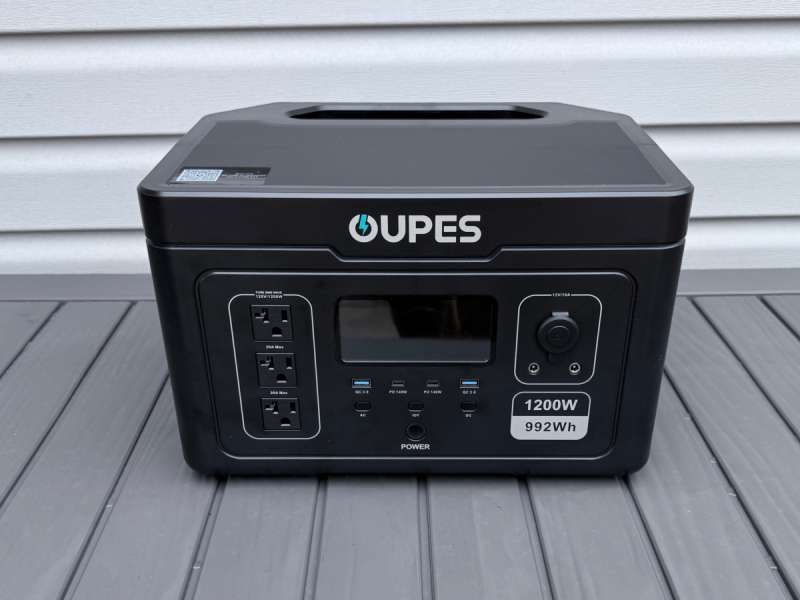
REVIEW – Hurricane Helene left us without power for a couple of days. When we lose power, there are two primary things that we want: to recharge our cell phones and keep the refrigerator running. Any size power station can do the former, but it takes a larger one to do the later. Of course, the bigger the battery, the longer it can supply power, and having the ability to recharge with solar panels can extend that time even further. In this review, I am testing the Exodus 1200 power station from Oupes to see how long it can keep the food in the refrigerator cold.
⬇︎ Jump to summary (pros/cons)
Price: $699.00
Where to buy: OUPES and Amazon (currently at 50% off)
What is it?
The Oupes Exodus 1200 is a power station that offers 1200 watts of power for AC, USB, and DC outputs. It can be charged via AC or DC, including a solar panel. Their tagline is “No power oops with Oupes.”
What’s included?
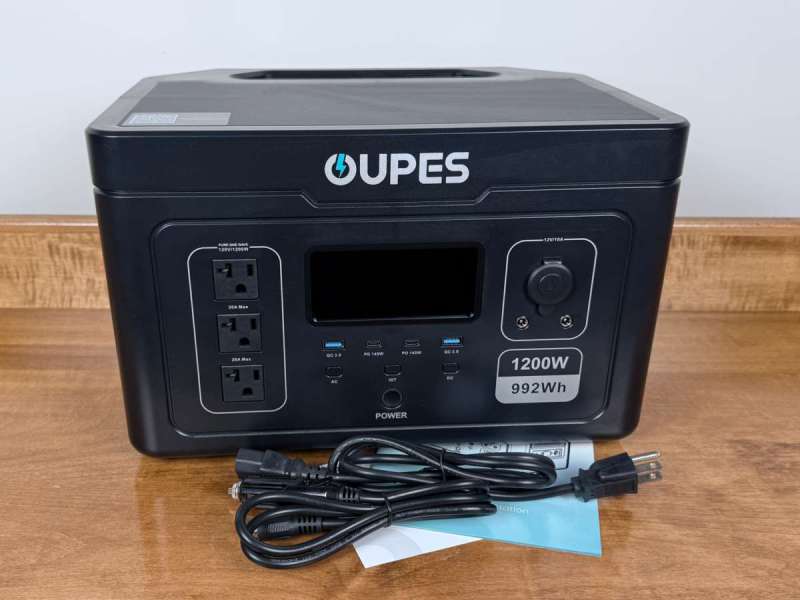
- Power station
- AC cable for charging
- DC cable for charging
- User manual
- Warranty card
Tech Specs
- Battery Capacity: 992 Wh
- Outputs: 3 AC, 2 USB-A, 2 USB-C, 2 DC (5521), 1 DC (car charger)
- AC Rated Power: 1200 W
- Inputs: AC, DC (for solar or a car charger)
- Weight: 23 lbs
- Size: 14.1 x 10.7 x 8.9 inches
‼️ This product uses a high-voltage lithium battery and poses a fire risk. Never leave the battery unattended while charging, and always disconnect the charger once the battery is full. Learn more about lithium battery safety here.
Design and Features
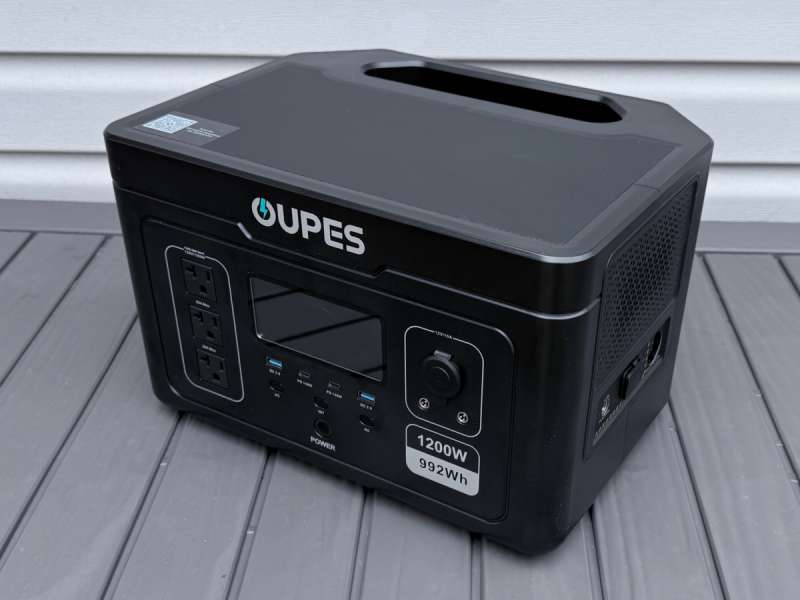
The Exodus 1200 is a large plastic box with a handle running across the back. The outputs and the digital display are on the front, and the inputs are on the right side. It’s a tried-and-true design that’s very common among power stations.
Assembly, Installation, and Setup
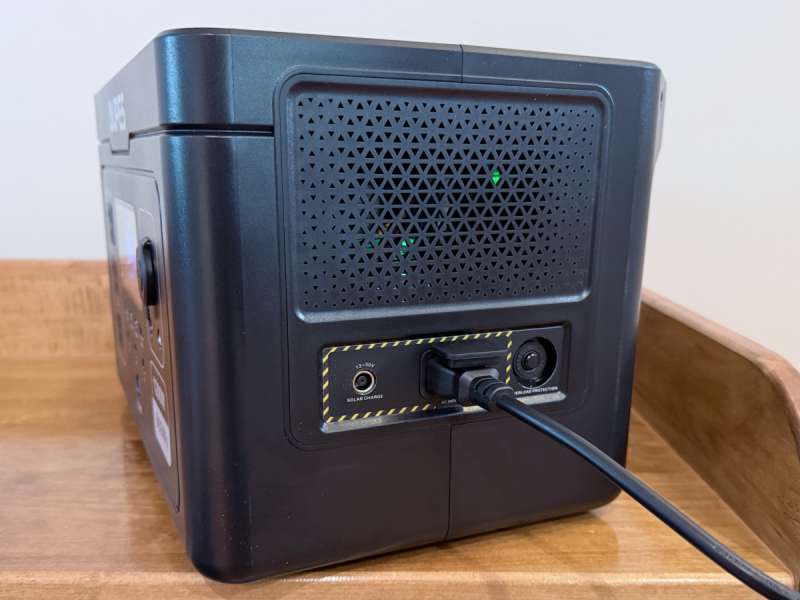
The Exodus 1200 arrived in a large box protected by custom foam inserts. I removed everything from its packaging and read through the manual. The battery can be charged using one of the inputs on the right side. I use the included power cable and charged it until the display panel said it was at 100%.
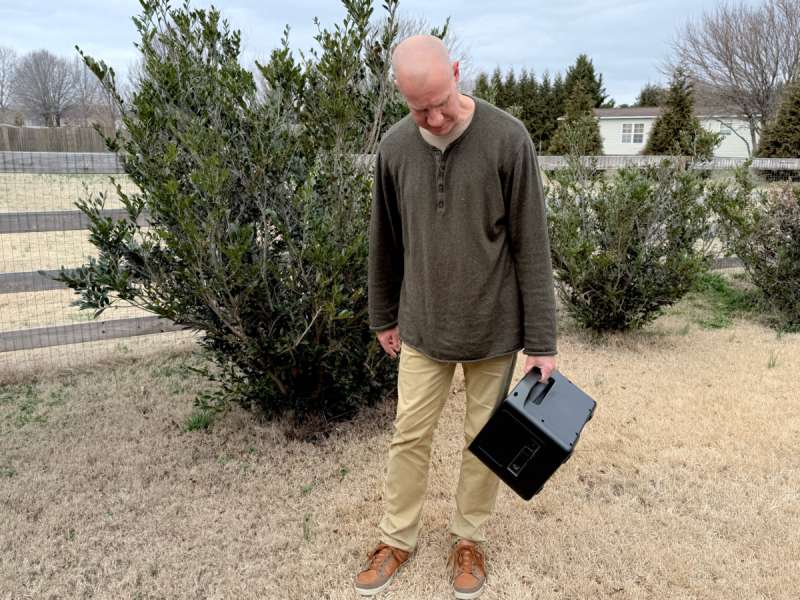
The handle is across the back, so when I pick the power station up, it tilts forward. It’s off-balance and awkward to carry around. I wish Oupes had put the handle in the middle or used a pair of handles, one on either end.
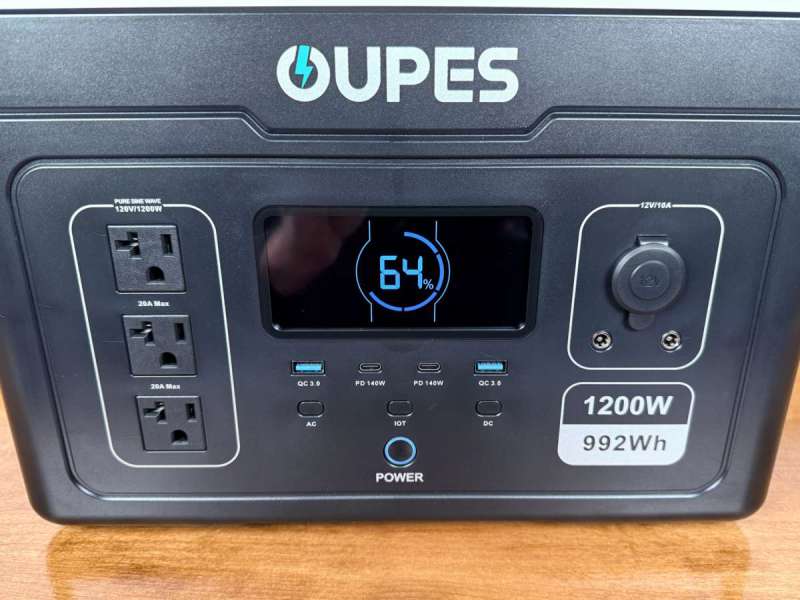
Operating it could not be any clearer. To turn on the power station, press and hold the Power button for five seconds.
Performance
In order to test the Exodus 1200, I planned a series of tests.
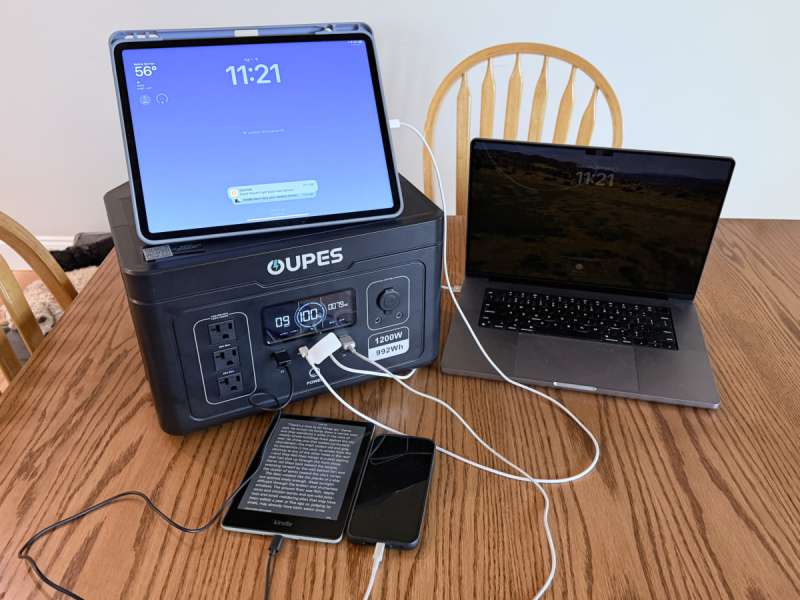
First, I used all four USB ports to recharge an iPad Pro, an iPhone, and a Kindle while powering a MacBook Pro. To do this, I pressed the DC button, which controls the USB and DC outputs, and plugged in everything. Though this test drew between 60 and 80 watts, the Exodus 1200 didn’t break a sweat.
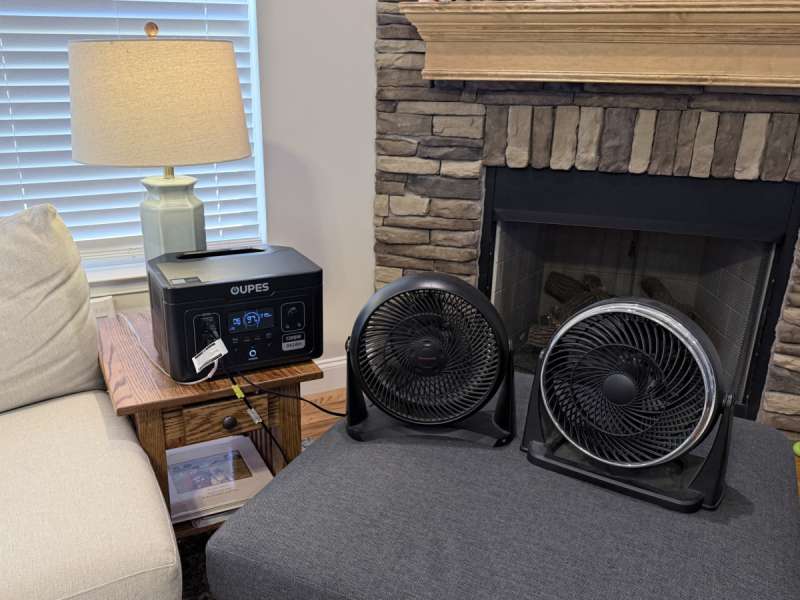
Second, I used all three of the AC ports to power two fans and a light. I pressed the AC button and then plugged them in, just as if they were outlets on the wall. This test drew just over 120 watts, but once again, the Exodus 1200 handled it easily.
Third, I used one of the AC ports to power to power a refrigerator. We have two fridges at our house, one in the garage and one in our kitchen. I started with the one in the garage, which is an older Whirlpool. It’s rated for 7.2 A max (when defrosting), so that’s around 800 W, well within the Exodus 1200’s capabilities. Despite this, I couldn’t get it to power the fridge. The power station would either turn itself off right away or throw error E001, which means “output overload protection.” This shouldn’t be true, especially given that peak power is rated at 3600 W. I don’t know why the Oupes couldn’t do this; I didn’t have any problem powering this fridge with my Bridna power station during Hurricane Helene.
(UPDATE Feb 13, 2024) – The engineers at Oupes replied to the article with this helpful clarification: “The problem stems from the refrigerator’s starting current exceeding the threshold limits of the Exodus 1200. While the rated current of the fridge is 7.2A, its starting current can be 3 to 7 times higher, which is why it couldn’t supply power properly.” I appreciate their explanation for the problem, and it’s good to know that if I need to buy a power station for a refrigerator or other large appliance, I will probably need to get one that is larger than what I think I will need.
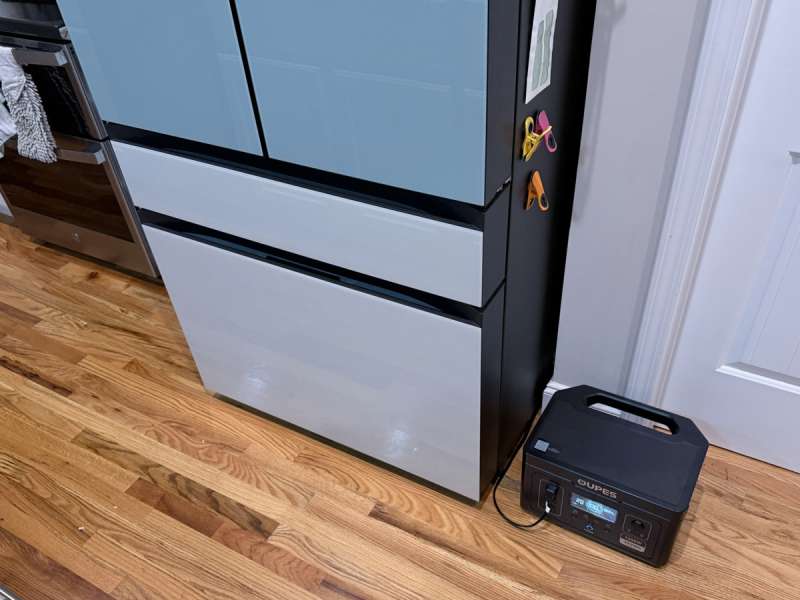
I then tested it with the Samsung in the kitchen, a newer fridge that only draws 3.5 A. I had more success here; even so, sometimes the Exodus 1200 shut itself off after a few hours. When it did work, it was able to power the Samsung for around 11 hours before running out of power. While it’s great to keep a fridge running for any amount of time when power is lost, 11 hours isn’t very long. I think this is the wrong gadget for the job; if I need to keep a fridge going, I should look for a power station with a much larger capacity.
Fourth, I wanted to test it with the solar panel that came with the Bridna. That panel has 3 different output plugs, M20, Anderson, and XT60. The Exodus 1200, however, only has a standard 12 V DC input. The lesson here is to make sure that the solar panel you get matches with your power station. Oupes makes two different panels that can work with this power station, one at 100 W and the other at 240 W.
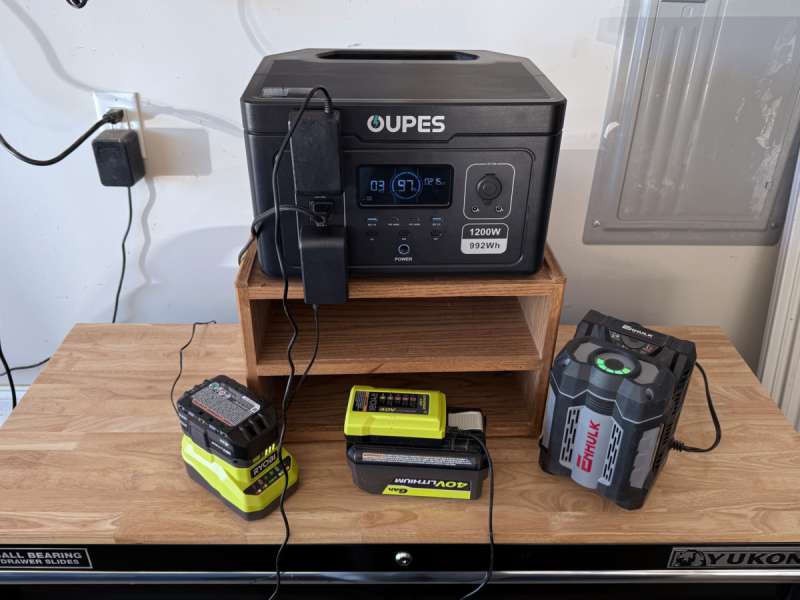
Finally, I took it out to the garage and used it to recharge three of the largest batteries for my various power tools, including a 58 V one for my AiDot Enhulk leaf blower. Together, these chargers took over 210 W of power, but the Oupes power station handled them all with ease.
The manual says that the Exodus 1200 can be connected to an app on my iPhone that would allow me “to view information, control the devices, and personalize settings,” which is what the IoT button is used for. I didn’t consider using this app, in part because it has a terrible rating and lots of complaints on the App Store, but mostly because I can’t see any real reason to use an app for a power station. It’s such a simple gadget: Turn it on; plug something in. I don’t need an app for that. I think Oupes should lower the complexity and cost of this gadget by removing this pointless capability.
Final thoughts
The Oupes Exodus 1200 is a mid-sized power station that can be charged from AC and DC sources and provides power to AC, DC, and USB ports. It had no problems charging and powering phones, tablets, laptops, fans, lights, and power tool chargers. It was unable, however, to power my Whirlpool refrigerator, even though it was well within the stated specs, and it struggled to power my Samsung refrigerator. As long as you don’t need to power larger appliances, this is a capable power station.
(NOTE: See the update above for an explanation from Oupes about the reason why it couldn’t power my Whirlpool.)
What I like about the Oupes Exodus 1200 power station
- Lots of power
- Clearly marked inputs and outputs
- Sharp, readable display
What needs to be improved?
- Center the handle
- Power appliances (with the power rating) without errors and shutting down
- Remove the app
Price: $699.00
Where to buy: OUPES and Amazon (currently at 50% off)
Source: The sample for this review was provided free of charge by Oupes. Oupes did not have a final say on the review and did not preview the review before it was published.
Check out these other reviews!
- VTOMAN FlashSpeed 600 Power Station review
- EcoFlow River 3 Plus Power Station review
- BLUETTI AC180P Portable Power Station 1,440Wh capacity review – a crazy idea that worked



Gadgeteer Comment Policy - Please read before commenting
How do you connect oupes exodus 1200 to wifi?
Thank you….
I don’t know. As I mentioned in the article, I have no desire to connect a power station to an app. Just seems overkills to me.